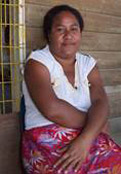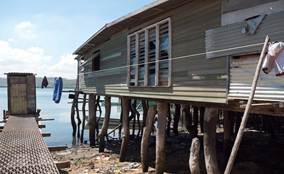Although it is clear mobile technology benefits women, there is little data available to better understand the day-to-day aspirations and challenges of women at the base of the pyramid. In order to work with and for them, the GSMA mWomen Programme, in partnership with USAID and AusAID, has commissioned a multi-country piece of research to explore the wants & needs of BOP women with the understanding that technology must meet the need, rather than vice-versa. Per Helmersen, GSMA mWomen Knowledge Manager, is currently reporting from the field where he is working on this research and he will be sharing some early, first-hand findings with the mWomen community on our blog during August. Today, he shares Sussan’s story of living and working in a village in Papua New Guinea (PNG) and how her mobile supports her business there:


Sussan (30) is a local businesswoman in a village numbering 8.000 on the outskirts of Port Moresby, PNG. Until recently this was a traditional fishing village founded around 1910, but it is increasingly dependent on employment opportunities at one of the multinational LNG sites in the Port Moresby area. Sussan’s husband is a scaffolding worker at one of the sites as are his two brothers who, along with their families, make up their extended household. While her husband is building PNG’s future, she looks after their three children (ages 1, 4 and 11) and runs a successful local business selling betel nuts, sweets, ice blocks and prepared meals to the local community.
Like many women in PNG’s villages, she became a betel nut and sweets seller to supplement the family’s income. She soon identified a business opportunity in the local ‘fast food’ sector and started buying meat from retail outlets in Port Moresby, preparing it over an open fire outside her home and selling individual and family-size portions to her neighbors. Since she purchased meat in larger quantities than most others could afford and also had a refrigerator for short-term storage, the locals found it convenient and cheaper to let Sussan cook their evening meals. She tells us that she usually buys meat for K75 if she can afford to and resells it for K100, generating K25 in profit. Demand is increasing, so she has applied for a bank loan to expand her business and buy a freezer in order to diversify her menu and increase her profit margin. The bank ignored her application, however, so she is compelled to borrow from family and friends. Interest rates are high – a two-week loan of K50 must be repaid with K75 and interest rates double if she needs and extension. Contrary to popular (Western) belief, this is a cash economy!
Sussan has had a mobile for about four years and cannot imagine life without it. When asked about her life before she purchased the K50 handset in Port Moresby, she struggles to remember what it was like and admits that she honestly can’t remember. She is by no means an advanced user, but since she and most of her contacts are literate, she routinely texts in either English or Pidgin, taking advantage of the send one SMS and get a xx free offers from Digicel. In addition to keeping in touch with remote family members the mobile is an indispensible business tool. She frequently calls her husband on his way home and asks him to pick up meat and other commodities, saving her a trip to town and the K2 bus fare. She is also eager to try out mobileSMK, the new mobile money service provided through Digicel and the local post office. This will allow her to receive and transfer funds to and from her husband and others by means of a familiar and trusted medium – SMS.

